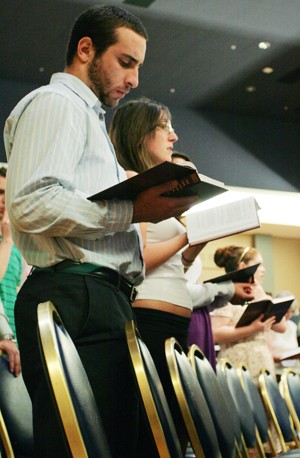While the majority of the UA campus embarks on its normal Tuesday routine, roughly 3,600 Jewish students must choose between observing their religious holidays and attending their regularly scheduled classes.
The Jewish High Holy Days of Yom Kippur and Rosh Hashanah rarely fall on the same days two years in a row. This causes many professors to forget that the holiday is coming and consequently schedule major assignments on days when it is forbidden for Jewish students to do work, said Rachel Tasky, a psychology junior.
Whenever the Jewish holidays occur during the school week, Tasky undoubtedly has a major assignment due, she said.
“”I feel like I get screwed, but at the same time, I don’t think the teachers even realize they should be looking at a calendar,”” Tasky said. “”The first thing (they think) is not, ‘Oh, it’s Rosh Hashanah that day, so I shouldn’t have a quiz that day.’ I think it’s just a lack of knowledge more than anything.””
Jen Jalowiec, vice president of the UA Hillel Foundation and a communications senior, said that the problem stems from teachers just not being aware of the calendar.
“”I think departments need to be held more responsible, because departments have to approve the syllabus,”” Jalowiec said. “”Departments should be held responsible for going through (syllabi) and saying, ‘Maybe you should reconsider having an exam on this day because that is a Jewish holiday.'””
Students who must miss classes for religious observance can be put at a disadvantage because they have to work twice as hard to catch up in classes, she said.
“”We have all Christian holidays off, so the majority of the campus doesn’t ever have to worry about missing (class) because of religious reasons,”” Jalowiec said. “”Every single Jewish holiday, we have to see if we are missing school. . . . (We are forced to) choose between our religion and school.””
Keith Humphrey, associate Dean of Students, said that the UA policy states that every student who misses class for any religious holiday must be provided with what they call “”reasonable accommodations.””
“”No one should be discriminated against for any religious belief or practice,”” Humphrey said. “”Administrators and faculty are expected to reasonably accommodate individual religious practices, and there should be no retaliation … against a student if they’re seeking accommodations.””
Michelle Blumenberg, executive director of Hillel, said that often times, students are unsure what rights they have when requesting “”reasonable accommodations.””
“”I think most students are put in the position of trying to figure out, do they miss class or not, do they tell their teacher or not?”” she said. “”They’re worried that if they do tell their teacher and try to get an accommodation, that there will be a repercussion for that.””
The responsibility of determining what fulfills the expectation of reasonable accommodations lies with the students, Humphrey said.
“”If the student feels that the accommodation they are being afforded by a faculty member is not reasonable, we encourage them to come to our office, and we can help them work through it,”” Humphrey said.
It is the student’s responsibility to report a teacher who they feel is not giving them a fair chance. Otherwise, there is no way of fixing the situation, Blumenberg said.
“”If (students are) not getting satisfaction from their faculty person, they are supposed to go to the director of the department,”” Blumenberg said. “”Then they can call us in at that point if they are still not getting satisfaction, and we also would work with the Dean of Students if we need to.””
Don McCarthy, a UA astronomy professor, said that he is always willing to work with students whenever an issue arises.
“”If a student feels there is a conflict that could arise due to a religious holiday, then (they’re) encouraged to contact me,”” McCarthy said. “”I just try to be respectful of any situation involving my students. Such situations could be athletic, religious, job interviews, family weddings and crises, illness.””
When planning a large lecture course, McCarthy said scheduling issues will always arise.
“”There is simply no way to avoid conflicts in scheduling deadlines in courses,”” McCarthy said. “”You just have to go with the flow and encourage communication while still maintaining high standards.””
Students don’t always feel comfortable when approaching their teachers and dealing with religious related conflicts, Blumenberg said.
“”The fear is repercussions,”” Blumenberg said. “”I don’t think it is related to anti-Semitism … That’s not what I am hearing. It is more they’re going to do what they’re going to do ’cause they are faculty and I’m a student – there is nothing I can do and I’m afraid to take any further steps because they’re going to penalize me.””
The problem could easily be fixed if members of the administration did a better job of notifying staff members that the holidays existed, Tasky said.
“”I think if the university did something as simple as recognizing the holidays and asking teachers if they could not schedule exams, it would be much appreciated,”” Tasky said.









